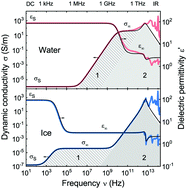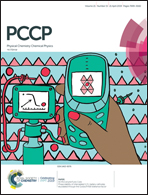A unified mechanism for ice and water electrical conductivity from direct current to terahertz
Abstract
Knowledge of the electrical properties of liquid and solid water is extremely important for a detailed understanding of their structures. Though the macroscopic parameters differ, ice and water still have much in common from the dielectric spectroscopy viewpoint and should thus be considered on the same footing for the study of their electrical properties. In this work, we treat the complete dielectric spectra of ice and water, covering fourteen orders in frequency magnitude. Introducing the notion of ‘excess proton gas’ we explain the similarities between ice and water, and derive a model which links together the infrared vibrations and the static conductivity and dielectric constant. This model provides a very good description of spectra up to 10 THz and reproduces well the temperature dependence of the dielectric constant for both ice and water. A new intermolecular polarization mechanism suitable for ice and water provides good insights for the understanding of their electrical properties.



 Please wait while we load your content...
Please wait while we load your content...